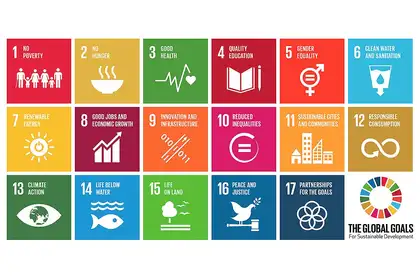
The United Nations’ 17 Sustainable Development Goals.
The United Nations’ 17 Sustainable Development Goals were created to address major global issues, including poverty, health, education, climate change, gender equality and social justice – and if they are to be achieved, the private sector has a key role to play.
That’s why the first ‘Big Issues in Business’ event for 2018 is focused on how the Sustainable Devlelopment Goals are changing corporate behaviour.
Associate Professor Gabriel Eweje, the director of Massey Business School’s Sustainability and Corporate Social Responsibility Research Group, will share the trends emerging from his research in this area. He says the goals have created both opportunities and challenges for businesses looking to integrate sustainability into long term-strategies.
“Three years on from the launch of the 17 Sustainable Development Goals, businesses are only just beginning to think seriously about how to embed the goals in their strategies,” he says. “I wouldn’t say New Zealand is lagging behind the rest of the world, but we definitely aren't leading either.”
Building partnerships is the 17th goal
Dr Eweje says the key to achieving the ambitious goals, which the United Nations developed with a wide range of stakeholders, including the business community, is collaboration.
“Building partnerships to achieve the goals is actually the 17th goal in the United Nations’ list and our current research is focused on how businesses can do this through multi-stakeholder partnerships. No single company, individual or government can do this on their own so collaboration with a whole range of partners, including other businesses, academics, government, NGOs and communities is essential.”
Dr Eweje says this approach is particularly important in New Zealand, which is a country of small and medium-sized businesses who do not have a strong history of collaboration.
“We aren't saying, 'Go and share your competitive strategies', it’s about sharing information that is for the common good. It’s a big shift for many businesses, but it is essential if we are to achieve the goals within the 2030 timeframe.”
Millennials will be a catalyst for change
He says companies need to listen to their stakeholders and align their strategies to the 17 goals if they want to position themselves well for the future. Investing in strategies that tackle the world’s challenges can help organisations to identify future areas for growth or innovation and increase the value of any corporate social responsibility programmes they have in place, he says.
“Millennials are watching what businesses are doing today and that is very important,” Dr Eweje says. “This generation could be a major catalyst for change, they tend to be more environmentally and socially minded and they know what they want from the companies they have relationships with.”
He says New Zealand businesses shouldn’t be daunted by the task. Making incremental changes to align existing strategies to the 17 goals can make a big difference, as long as the changes are a genuine shift and not just “green washing”.
Dr Eweje will be speaking at three ‘The Rise of Good Business’ events in Auckland, Wellington and Palmerston North. He will be joined by Lisa Martin, general manager sustainability at Sanford Group, who will share her organisation’s learnings from implemeting its sustainability strategy. The event is part of the the Massey Business School’s ‘Big Issues in Business’ series, which brings research and practitioner insights together to address the big issues faced by businesses.
Event details:
Auckland, 15 May 2018
5:30 – 7 pm
ASB Cube
12 Jellicoe Street
North Wharf
Wynyard Quarter
Wellington, 16 May 2018
5:30 – 7 pm
IMNZ
Level 7, Jackson Stone House
3-11 Hunter St
Palmerston North, 18 May 2018
4 – 5:30 pm
The Factory
21 Dairy Farm Road